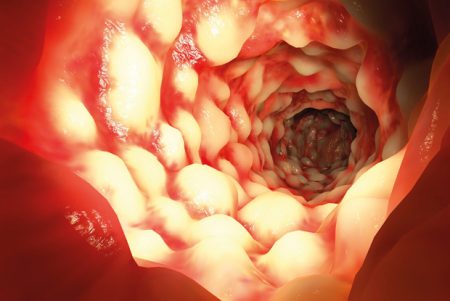August 18, 2018 – My nephew suffers from Crohn’s Disease, a chronic intestinal disease that affects over 4 million people around the globe. He has had multiple hospitalizations over the years because of repeated inflammatory bowel problems and has had part of his colon removed. Crohn’s is a debilitating autoimmune disease. It causes inflammation of the lining of the colon. Symptoms include abdominal pain, diarrhea, and low energy levels in the affected individual.
Current methods for confirming the condition based on a patient history involves different versions of examinations of the colon, from colonoscopy to capsule endoscopy, to balloon-assisted enteroscopy. CT scans and MRIs are also used to look at the entire bowel tract to pinpoint the extent of inflammation and potential ulcerations in the lining of both the small and large intestine.
The drugs of choice are anti-inflammatories including corticosteroids and aminosalicylates. Immune suppression medications are also used with methotrexate often prescribed. And then there are antibiotics given to try and heal ulcerations and abscesses in the bowel including Cipro and Metronidazole. And for the treatment of common symptoms patients take fibre supplements, pain medication, iron supplements, Vitamin B-12, Vitamin D, and calcium.
Diet and nutrition counseling is something every Crohn’s patient receives to help reduce inflammatory bowel episodes. Limiting dairy products, low-fat foods, and high-fibre is recommended.
Ultimately, however, many Crohn’s patients end up having surgery to remove the damaged portions of the bowel and to excise abscesses and drain infections.
The Mayo Clinic provides an excellent summary of Crohn’s Disease, treatment, and lifestyle options.
With no cure for Crohn’s researchers have turned to look at how to reverse what causes it – a broken immune system. Among those seeking an answer are researchers at Queen Mary University of London, and the University of Sheffield, where a clinical trial has started using stem cell transplants. In a press release James Lindsay, Professor at Queen Mary is quoted stating, “Despite the introduction of new drugs, there are still many patients who don’t respond, or gradually lose response, to all available treatments…..We’re hoping that by completely resetting the patient’s immune system through a stem cell transplant, we might be able to radically alter the course of the disease. While it may not be a cure, it may allow some patients to finally respond to drugs which previously did not work.”
So what’s involved for patients enrolled in the clinical trial? There are a number of steps including:
- Patients are given chemotherapy to remove their faulty immune systems.
- Patients also receive hormone treatments aimed at stimulating stem cell production.
- The stem cells are then harvested from the patient’s blood and cultured to increase their numbers.
- Then the stem cells are then injected back into the patient to grow a new immune system.
The protocol being used here is based on stem cell transplant treatments of patients with multiple sclerosis which have seen some success. The hope is that the newly acquired immune system will no longer attack the patient’s bowel and digestive tract, and will better tolerate medications used to reduce Crohn’s symptoms. You can watch a YouTube video which provides additional information about Queen Mary University’s clinical trial.
The clinical trial is being funded by the UK’s National Institute for Health Research (NIHR). Tom Walley, Director of the NIHR evaluation in the Queen Mary press release states, “Stem cell therapies are an important, active and growing area of research with great potential. There are early findings showing a role for stem cells in replacing damaged tissue. In Crohn’s disease, this approach could offer real benefits for the clinical care and long-term health of patients.”
The current clinical trial is built on a previous stem cell trial where the approach was similar but the drug doses, particularly the chemotherapy, produced serious side effects. Despite this, the first trial did show some positive results. So in this current trial, treatment doses of the drugs being used are lowered with the hope that this will lead to better patient outcomes.
For Crohn’s sufferers, of which my nephew is one, the results of this clinical trial may lead to a far more promising future in having to cope with this debilitating disease.









